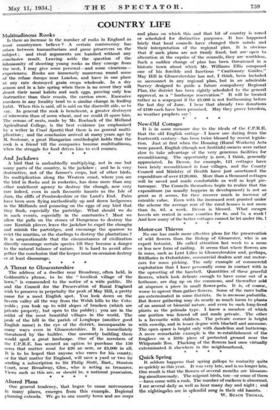Motor-car Thieves No one has made more effective pleas for
the preservation of wild flowers than the Bishop of Gloucester, who is an expert botanist. He called attention last week to a more or less new form of raiding. It seems that where flowers are in mass, such as Lent Lilies in Gloucestershire and, perhaps, fritillaries in Oxfordshire, commercial dealers sent out motor- cars for mass picking. The only example of commercial exploitation that 'I have personally come in contact with is the uprooting of the harebell. Quantities of these graceful flowers, which look delicate enough to have come out of a hothouse, are dug up on the commons, and thereafter sold at sixpence a piece in small flower-pots. It is, of course, worse to uproot than gather flowers. Some of the rarer bulbs are exterminated in some districts. So is anemone pulsatilla. But flower gathering may do nearly as much harm to plants of an annual or biennial' nature, and even to such long-lived plants as the primula type. I know a meadow of which one portion was fenced off and made private. The other is a favourite with children. The private corner is bright with cowslip, and in lesser degree with bluebell and anemone. The open space is bright only with dandelion and buttercup. A more remarkable example is the re-establishment of the foxglove on a little piece of protected ground near the Whipsnade Zoo. Plucking of the flowers had once virtually exterminated it elsewhere in the neighbourhood.








































 Previous page
Previous page